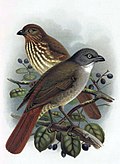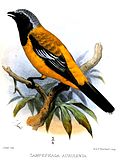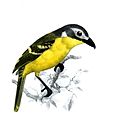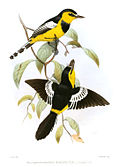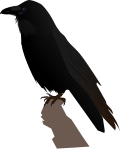Coracina
| Coracina | |
|---|---|

| |
| Black-faced cuckooshrike (Coracina novaehollandiae) | |
| Scientific classification | |
| Domain: | Eukaryota |
| Kingdom: | Animalia |
| Phylum: | Chordata |
| Class: | Aves |
| Order: | Passeriformes |
| Family: | Campephagidae |
| Genus: | Coracina Vieillot, 1816 |
| Type species | |
| Corvus papuaensis Gmelin, JF, 1788
| |
| Species | |
|
see article. | |

Coracina is a large genus of birds in the cuckooshrike family Campephagidae.
The genus was introduced by the French ornithologist Louis Pierre Vieillot in 1816.[1] The type species was subsequently designated as the white-bellied cuckooshrike by the German ornithologist Jean Cabanis in 1850–1851.[2][3] The name Coracina is from the Ancient Greek korakinos meaning "little raven", a diminutive of korax meaning "raven".[4]
The genus formerly included many more species. It was split based on the results of a molecular phylogenetic study published in 2010. A major clade was moved to the resurrected genus Edolisoma and a smaller group of Asian and Indian Ocean species moved to the genus Lalage.[5][6]
The genus contains the following 23 species:[6]
- Stout-billed cuckooshrike (Coracina caeruleogrisea)
- Hooded cuckooshrike (Coracina longicauda)
- Cerulean cuckooshrike (Coracina temminckii)
- Pied cuckooshrike (Coracina bicolor)
- Ground cuckooshrike (Coracina maxima)
- Barred cuckooshrike (Coracina lineata)
- Black-faced cuckooshrike (Coracina novaehollandiae)
- Boyer's cuckooshrike (Coracina boyeri)
- Buru cuckooshrike (Coracina fortis)
- Wallacean cuckooshrike (Coracina personata)
- North Melanesian cuckooshrike (Coracina welchmani)
- South Melanesian cuckooshrike (Coracina caledonica)
- Bar-bellied cuckooshrike (Coracina striata)
- Javan cuckooshrike (Coracina javensis)
- Large cuckooshrike (Coracina macei)
- Andaman cuckooshrike (Coracina dobsoni)
- Slaty cuckooshrike (Coracina schistacea)
- White-rumped cuckooshrike (Coracina leucopygia)
- Sunda cuckooshrike (Coracina larvata)
- White-bellied cuckooshrike (Coracina papuensis)
- Manus cuckooshrike (Coracina ingens)
- Moluccan cuckooshrike (Coracina atriceps)
- Little cuckooshrike (Coracina robusta mentalis)[7]
References
- ^ Vieillot, Louis Pierre (1816). Analyse d'une Nouvelle Ornithologie Élémentaire (in French). Paris: Deterville/self. p. 37.
- ^ Cabanis, Jean; Heine, Ferdinand (1850–1851). Museum Heineanum : Verzeichniss der ornithologischen Sammlung des Oberamtmann Ferdinand Heine, auf Gut St. Burchard vor Halberstadt (in German and Latin). Vol. 1. Halberstadt: R. Frantz. p. 18.
- ^ Mayr, Ernst; Greenway, James C. Jr, eds. (1960). Check-list of Birds of the World. Vol. 9. Cambridge, Massachusetts: Museum of Comparative Zoology. p. 168.
- ^ Jobling, James A. (2010). The Helm Dictionary of Scientific Bird Names. London: Christopher Helm. p. 117. ISBN 978-1-4081-2501-4.
- ^ Jønsson, K.A.; Bowie, R.C.K.; Nylander, J.A.A.; Christidis, L.; Norman, J.A.; Fjeldså, J. (2010). "Biogeographical history of cuckoo-shrikes (Aves: Passeriformes): transoceanic colonization of Africa from Australo-Papua". Journal of Biogeography. 37 (9): 1767–1781. Bibcode:2010JBiog..37.1767J. doi:10.1111/j.1365-2699.2010.02328.x. S2CID 52105369.
- ^ a b Gill, Frank; Donsker, David, eds. (2019). "Bristlehead, butcherbirds, woodswallows, ioras, cuckooshrikes, Shriketit". World Bird List Version 9.2. International Ornithologists' Union. Retrieved 20 August 2019.
- ^ Mathews, Nov. Zool., Vol XVIII, p 327,1912

